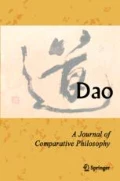Abstract
This article uses the Confucian and Neo-Confucian slogan that we should strive to “form one body with all things” as a starting point for asking whether the organismic metaphors so central to their ontology might be compatible with and of service to contemporary thinkers in cognitive science and philosophy of mind who are actively pursuing a fully embodied theory of mind. In this article I draw upon lines of inquiry exemplified in the work of George Lakoff and Mark Johnson (Lakoff and Johnson 1999) and Andy Clark (Clark 1997) who take different routes to important conclusions that I argue would be even more convincing where they to be seen from within the context of an ontology that draws upon organismic rather than mechanistic metaphors. In short, this article draws attention to the largely unnoticed fact that a fully embodied understanding of mind, one that treats knowledge as a kind of active engagement with the world rather than as a purely cognitive state, points away from mechanistic metaphors and toward organismic ones.
Similar content being viewed by others
References
Aberg, Christoffer, Karl E. Duderstadt, and Antoine M. van Oijen. 2016. “Stability versus Exchange: A Paradox in DNA Replication.” Nucleic Acids Research 44.10: 4846–4854.
Behuniak Jr, James. 2003. Mencius on Becoming Human. Albany: State University of New York Press.
Chan, Wing-tsit. 1963. “Introduction.” In Instructions for Practical Living and Other Neo-Confucian Writings by Wang Yang-ming. New York: Columbia University Press.
Clark, Andy. 1997. Being There: Putting Brain, Body, and World Together Again. Cambridge: MIT Press.
______. 2017. “Busting Out: Predictive Brains, Embodied Minds, and the Puzzle of the Evidentiary Veil.” Noûs 51.4: 727–753.
Cua, Antonio. 1982. Unity of Knowledge and Action: A Study in Wang Yang-ming’s Moral Psychology. Honolulu: University of Hawaii Press.
Day, William. 2012. “Zhengzi and Acknowledgement in Wang Yangming and Stanley Cavell.” Journal of Chinese Philosophy Supplement S1.39: 51–68.
De Haan, Daniel D. 2018. “Hylomorphism and the New Mechanist Philosophy in Biology, Neuroscience, and Psychology.” In Neo-Aristotelian Perspectives on Contemporary Science, edited by William M. R. Simpson, Robert C. Koons, and Nicholas J. Teh. New York: Routledge.
Damasio, Anton. 1994. Descartes’ Error: Emotion, Reason and the Human Brain. New York: Putnam Publishing.
Frisina, Warren. 2002. The Unity of Knowledge and Action: Toward a Nonrepresentational Theory of Knowledge. Albany: State University of New York Press.
______. 2009. “Response to Yang Xiaomei.” Dao: A Journal of Comparative Philosophy 8.3: 327–331.
Hall, David L., and Roger T. Ames. 1987. Thinking Through Confucius. Albany: State University of New York Press.
______. 1995. Anticipating China: Thinking Through the Narratives of Chinese and Western Culture. Albany: State University of New York Press.
______. 1997. Thinking from the Han: Self, Truth, and Transcendence in Chinese and Western Culture. Albany: State University of New York Press.
Huang, Yong. 2017. “Confucianism.” In Routledge Handbook of Religion and Ecology, edited by Willis J. Jenkins, Evelyn Tucker, and John Grimm. New York: Routledge.
Hume, David. 1985. A Treatise of Human Nature. New York: Penguin Books.
Lakoff, George, and Mark Johnson. 1999. Philosophy in the Flesh. New York: Basic Books.
Lu, Yinghua. 2019. “Wang Yangming’s Theory of the Unity of Knowledge and Action Revisited: An Investigation from the Perspective of Moral Emotion.” Philosophy East and West 69.1: 197–214.
Moore, G. E. 1994. Principia Ethica, 2nd ed. Cambridge: Cambridge University Press.
Needham, Joseph. 1956. Science and Civilisation in China. Cambridge: Cambridge University Press.
Ruse, Michael. 2013. “From Organicism to Mechanism—And Halfway Back?” In Beyond Mechanism: Putting Life Back into Biology, edited by Brian G. Henning and Adam C. Scarfe. Lanham: Lexington Books.
Shulkin, Jay. 2000. Roots of Social Sensibility and Neural Function. Cambridge, MA: Massachusetts Institute of Technology Press.
______. 2004. Bodily Sensibility. New York: Oxford University Press.
Slingerland, Edward. 2003. Effortless Action: Wu-Wei as a Conceptual Metaphor and Spiritual Ideal in Early China. New York: Oxford University Press.
______. 2018. Mind and Body in Early China: Beyond Orientalism and the Myth of Holism. New York: Oxford University Press.
Strawson, Galen. 2006. “Realistic Monism—Why Physicalism Entails Panpsychism.” Journal of Consciousness Studies 13.10–11: 3–31.
______. 2016. “Mind and Being: The Primacy of Panpsychism.” In Panpsychism: Contemporary Perspectives, edited by Godehard Brüntrup and Ludwig Jaskolla. New York: Oxford University Press.
Tu, Wei-ming. 1985. Confucian Thought: Selfhood as Transformation. Albany: State University of New York Press.
Wang, Yang-ming. 1963. Instructions for Practical Living and Other Neo-Confucian Writings. Trans. by Wingtsit Chan. New York: Columbia University Press.
Yang, Xiaomei. 2009. “How to Make Sense of the Claim: ‘True Knowledge is What Constitutes Action’: A New Interpretation of Wang Yangming’s Doctrine of the Unity of Knowledge and Action.” Dao: A Journal of Comparative Philosophy 8.2: 173–188.
Acknowledgments
I would like to thank the two anonymous readers who provided very helpful comments that strengthened this article’s argument significantly, especially with respect to my discussion of Wang Yangming’s understanding of “forming one body with all things.”
Author information
Authors and Affiliations
Corresponding author
Additional information
Publisher’s Note
Springer Nature remains neutral with regard to jurisdictional claims in published maps and institutional affiliations.
Rights and permissions
About this article
Cite this article
Frisina, W.G. Forming One Body with All Things: Organicism and the Pursuit of an Embodied Theory of Mind. Dao 21, 107–133 (2022). https://doi.org/10.1007/s11712-021-09817-5
Accepted:
Published:
Issue Date:
DOI: https://doi.org/10.1007/s11712-021-09817-5




